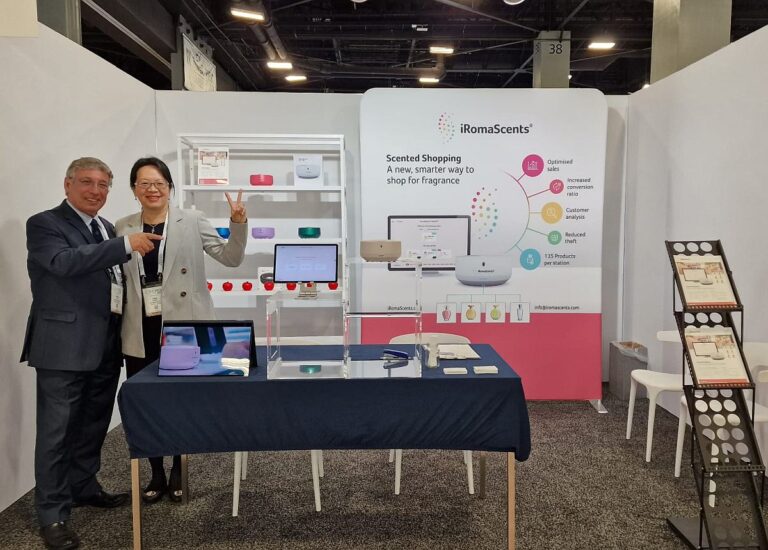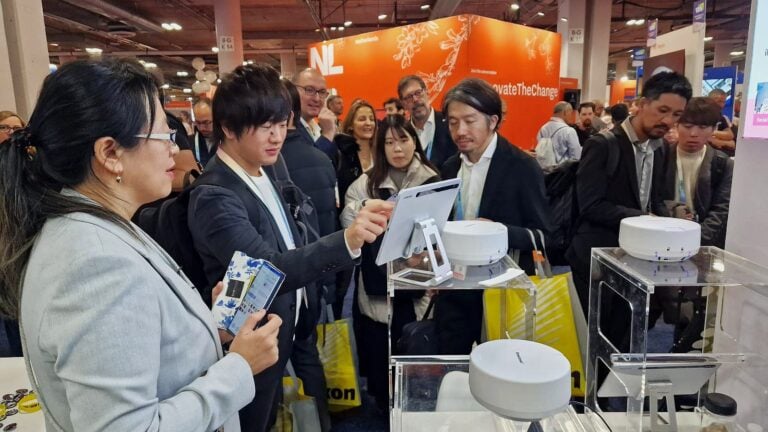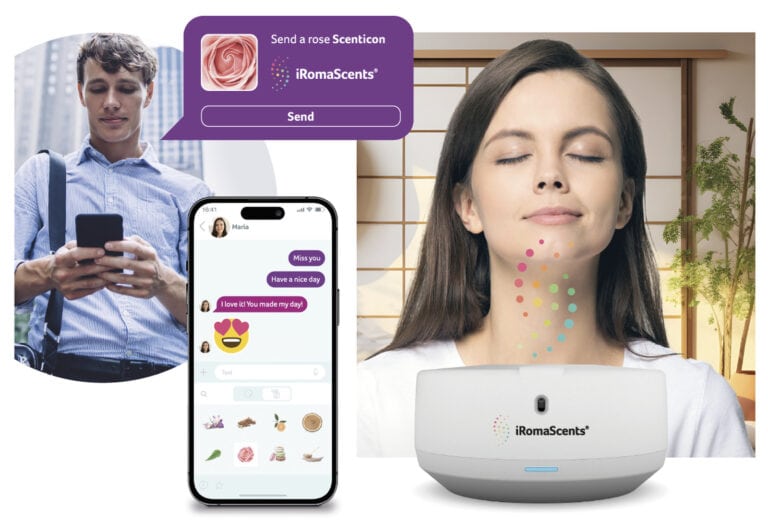In 1939, inventor Hans Laube introduced “Smell-O-Vision” at the New York World’s Fair. The cumbersome system of pipes attached to a circular mechanism containing vials of odorous liquid was intended to be released into movie theaters to enhance the experience.
Smell-O-Vision appeared in an actual movie only 20 years later – 1960’s Scent of Mystery, a thriller that challenged viewers to identify the villain through olfactory clues. (Was that Coca-Cola in the murderer’s glass…or vodka?)
The fact that neither Smell-O-Vision nor an alternative, Aromavision, ever caught on – they were just too pricey to install — didn’t stop Avner Gal, the CEO and cofounder of Israeli startup iRomaScents, from rebooting Smell-O-Vision for the 2020s.
iRomaScents created “Scented Movies” with components that couldn’t exist in 1939 or 1960. Its device, the size of a small router, is filled with boxes of “whiffs” and fits under each seat, beaming the scent to the viewer at the right point in the movie’s progression. The system runs on a rechargeable battery and is quick and easy to install.
A funny thing happened on the way to scented movie nirvana, though.
Gal and his cofounder Erin Berry, who works from the UK, have been showing off their tech at the CES trade show for the past three years. But movie theaters simply weren’t interested.
“The logistics were too complex,” Gal tells ISRAEL21c. “You have to convince the theaters to install it, then get permission from the movie [studios] to add the scents.”
But CES attendees went gaga over another application for iRomaScents: choosing perfumes.
Shopping wizard
Deciding on a fragrance at the local pharmacy or Sephora shop is too often an exercise in frustration, Berry explains.
“You spend 20 minutes opening bottles. You then ask the shop salesperson, ‘So, what do you like?’ The conversion rate is terrible. Many people just give up and walk away without making a purchase.”
For retail outlets, iRomaScents developed an AI Wizard that asks shoppers a series of questions on a tablet. Based on the responses –the questionnaire takes about two minutes to complete – the Wizard recommends a top fragrance for the consumer plus three backups.
Berry showed ISRAEL21c some videos of visitors to the iRomaScents booth at CES. “Their mouths hang open because they are so excited about what the device has recommended. Some people will say, ‘Wow, that’s exactly what I use! Chanel No. 5 or a product from L’Oréal.’”

Selling to retailers transforms the iRomaScents’ value proposition from a “nice-to-have” entertainment gimmick to a “must-have” that bumps up profits while minimizing frustration — although Berry points out that that the device can help sell products at the movies too. Nothing says “buy me” better than the smell of fresh roasting coffee, she notes.
A home-use system is also in the works. Here, someone interested in buying perfume or aftershave would run the iRomaScents AI Wizard at home and receive a link to the closest store selling the chosen fragrance.
A market need
Each iRomaScents device can hold up to 45 “whiffs,” so the average perfume counter would need three of them to cover the 135 fragrances a store typically stocks.

iRomaScents contractors would refill the devices as part of a “printer and ink” model, where the device itself is relatively inexpensive and the company makes its profit on the consumable — in this case, liquid perfume.
Gal notes that competing scent companies use solid materials, which is a disadvantage.
“When you open a sealed package for a solid, it turns to vapor, and you have no control over how long it takes. You have to build in a fan, but the faster the fan runs, the faster the solid will fade.”
The timing for this product is right, Berry says.
“People are getting used to shopping on screen, whether at home or outside. That’s one reason why, when people see our solution, they’re so excited. We’ve confirmed there’s a real need in this market.”
Indeed, Industry Research Co. estimates the current size of the home fragrance market at just over $7 billion a year worldwide, and expects it to grow to nearly $10 billion by 2028.

A device to deliver scents at the perfume counter also fits with a dispiriting trend happening across the United States: theft.
“Sephora just announced they will be locking all their items behind glass. Walgreens and CVS, too,” Gal laments. That’s placed extra burden on staff to constantly unlock the cases. “With our device, there’s nothing to steal and the real estate required is very small.”
Scented emojis
iRomaScents ran a pilot in Japan and has enthusiastically hit up the US exhibition scene as it gears up for mass production and sales.
At the latest CES show in January, iRomaScents introduced its new Scenticon application – a way to send scented emojis.
“People send some five billion emojis a day over the web. We converted that into a new generation of emojis that share your emotions by smell.” (The recipient must have an iRomaScents device.)

Another potential market is corporate customers who want to tweak the smells of their products.
“Cleaning aids, dish soaps, laundry detergents all have a smell,” Gal says. “Companies spend a lot of effort to get the right smell. Today, when a sales agent comes to talk with customers, they have to carry a lot of bottles with smells. Now they can take just one device.”
Also in the future, smells could become part of virtual reality goggles-based video games on devices such as the just-released Apple Vision Pro or Meta’s Quest.
“It all makes scents,” Gal quips.
Smells are forever
Smell and memory are closely linked because of the brain’s anatomy. This means, says Gal, that “once you get a smell in your head, it stays with you almost forever.”

The idea for the company is also something that stuck with Gal for a long time.
During a 24-year career in the Israeli navy, he earned master’s degrees in electrical engineering and business administration. He and Berry then became business partners.
For many years, they managed Ashkelon-headquartered Integrity Applications, which developed a noninvasive glucose monitor. The company’s flagship product, GlucoTrack, senses blood-sugar level via an ultrasonic, electromagnetic and thermal device attached to the earlobe.
“Avner is always stimulating his brain to improve lives and make the world better,” Berry says.
“Even when we were busy with the glucose monitor, he told me, one day, he wanted to make scented movies. The idea stayed in the back of his mind for years.”
The five-person, Rishon LeZion-based iRomaScents was founded in 2019 as a bootstrapped company, then raised $4 million in late 2020. Another $3 million, out of a planned $10 million round, is in the bank now while fundraising continues.














